|
De Amerikaanse schrijver Jack London (eig. John Griffith Chaney) werd geboren op 12 januari 1876 in San Francisco, Californië. Zie ook alle tags voor Jack London op dit blog.
Uit: The Call of the Wild
“With the aurora borealis flaming coldly overhead, or the stars leaping in the frost dance, and the land numb and frozen under its pall of snow, this song of the huskies might have been the defiance of life, only it was pitched in minor key, with long-drawn wailings and half-sobs, and was more the pleading of life, the articulate travail of existence. It was an old song, old as the breed itself—one of the first songs of the younger world in a day when songs were sad. It was invested with the woe of unnumbered generations, this plaint by which Buck was so strangely stirred. When he moaned and sobbed, it was with the pain of living that was of old the pain of his wild fathers, and the fear and mystery of the cold and dark that was to them fear and mystery. And that he should be stirred by it marked the completeness with which he harked back through the ages of fire and roof to the raw beginnings of life in the howling ages. Seven days from the time they pulled into Dawson, they dropped down the steep bank by the Barracks to the Yukon Trail, and pulled for Dyea and Salt Water. Perrault was carrying despatches if anything more urgent than those he had brought in; also, the travel pride had gripped him, and he purposed to make the record trip of the year. Several things favored him in this. The week's rest had recuperated the dogs and put them in thorough trim. The trail they had broken into the country was packed hard by later journeyers. And further, the police had arranged in two or three places deposits of grub for dog and man, and he was travelling light. They made Sixty Mile, which is a fifty-mile run, on the first day; and the second day saw them booming up the Yukon well on their way to Pelly. But such splendid running was achieved not without great trouble and vexation on the part of Francois. The insidious revolt led by Buck had destroyed the solidarity of the team. It no longer was as one dog leaping in the traces. The encouragement Buck gave the rebels led them into all kinds of petty misdemeanors. No more was Spitz a leader greatly to be feared. The old awe departed, and they grew equal to challenging his authority. Pike robbed him of half a fish one night, and gulped it down under the protection of Buck. Another night Dub and Joe fought Spitz and made him forego the punishment they deserved. And even Billee, the good-natured, was less good-natured, and whined not half so placatingly as in former days. Buck never came near Spitz without snarling and bristling menacingly.”
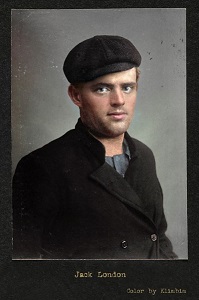
Jack London (12 januari 1876 – 22 november 1916)
De Hongaarse schrijver Ferenc Molnár werd op 12 januari 1878 in een burgerlijk-joods gezin van Duitse afkomst geboren. Zie ook alle tags voor Ferenc Molnár op dit blog.
Uit: A Matter Of Husbands (Vertaald door Benjamin Glazer)
“EARNEST YOUNG WOMAN: No. I'll read it to you. [She opens it and reads mournfully] "My darling, Shan't be able to call for you at the theater tonight. Urgent business. A thousand apologies. Ten thousand kisses. Alfred."
FAMOUS ACTRESS: Oh!
EARNEST YOUNG WOMAN: I found it on his desk this morning. He probably intended to send it to the theater by messenger. But he forgot it. And I opened it. [She weeps.]
FAMOUS ACTRESS: You mustn't cry.
EARNEST YOUNG WOMAN: [Sobbing] Why mustn't I? You steal my husband and I mustn't cry! Oh, I know how little it means to you. And how easy it is for you. One night you dress like a royal princess, and the next night you undress like a Greek goddess. You blacken your eyebrows and redden your lips and wax your lashes and paint your face. You have cosmetics and bright lights to make you seem beautiful. An author's lines to make you seem witty and wise. No wonder a poor, simple-minded lawyer falls in love with you. What chance have I against you in my cheap little frock, my own lips and eyebrows, my own unstudied ways? I don't know how to strut and pose and lure a man. I haven't got Mr. Shakespeare to write beautiful speeches for me. In reality you may be more stupid than I am, but I admit that when it comes to alluring men I am no match for you.
FAMOUS ACTRESS: [Without anger, slowly, regards her appraisingly] This is a very interesting case.
EARNEST YOUNG WOMAN: What is?
FAMOUS ACTRESS: Yours.
EARNEST YOUNG WOMAN: Mine? What do you mean?
FAMOUS ACTRESS: I mean that I never received a flower, or a letter, or anything else from your husband. Tell me, haven't you and your husband been getting on rather badly of late?
EARNEST YOUNG WOMAN: Yes, of course.
FAMOUS ACTRESS: You used to be very affectionate to each other?
EARNEST YOUNG WOMAN: Why, yes.
FAMOUS ACTRESS: And of late you have been quite cold?
EARNEST YOUNG WOMAN: Yes.”
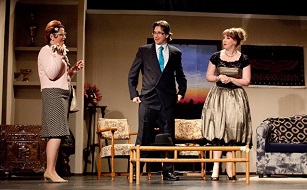
Ferenc Molnár (12 januari 1878 – 1 april 1952)
Scene uit een opvoering in Brisbane, 2011
De Nederlandse dichter, schrijver en schilder Alain Teister (eig. Jacob Martinus Boersma werd geboren in Amsterdam op 12 januari 1932. Zie ook alle tags voor Alan Teister op dit blog.
Uit:Brief aan de eigenaar
“Als hulpverlening voor de lange zondagmiddagen, waar we werkelijk geen raad meer mee wisten, had een vriend ons een handige kaart doen verstrekken, die toegang gaf tot een landgoed dat ik voor het gemak, of eerder uit veiligheidsoverwegingen Eikenhof zal noemen. De kaart kon door dames en heren worden verworven mits zij van Nederlandse nationaliteit waren, van onbesproken gedrag en een soort meerderjarigheid bezaten: achttien jaar was de grens, alsof men op gezette tijden tegen het herfstrood van bomen en struikgewas kleine, onzedelijke films vertoonde.
Ka en ik zijn duidelijk geen mensen voor bos, landgoed en wandeling. Maar ook niet, bleek, voor zondagmiddag, waar wij toch eens heftig verlangend naar hadden uitgezien: stille, warme middagen, samen lezend, beschermd door uitvluchten tegen allerlei mogelijk aankomende vrienden; de kachel zou zacht branden (wij stelden onze toekomstverwachtingen meestal in op een stervend na-seizoen), en tegen vijven besloop schemering de kamer; elkaar aankijken, en zo.
Hoe aardig de boeken ook waren, die we hadden gekocht of uit bibliotheken haalden, we redden het niet. In hoeverre dat samenhing met de kwaliteit van ons huwelijk is niet zo eenvoudig na te gaan, maar wat vroeger een eiland van rust had geschenen (welke tien boeken zoudt u meenemen als u met uw vrouw op een onbewoond eiland zoudt geraken) werd nu een onrustig geschuifel, heen en weer lopen, de radio aan en uit draaien, het ‘niet hebben’. Ik zal hierover kort zijn, ook al omdat er verder niets over te zeggen valt dan dat het godvergeten afschuwelijke middagen werden, waarop we allebei het neerdrukkende gevoel hadden tekort te schieten, tegenover elkaar, tegenover onze lectuur ook wel; van beiden werd iets verwacht wat we niet uitspraken, maar wat nog wel duidelijk worden zal; ik dacht er vaak aan, dat ik in het café zou willen zitten, langzaam biljartend, kleine glazen jenever drinkend, met drie vier mensen zwijgend aan tafeltjes; schemerig zou het er al zijn, nu, een beetje geurend naar brouwersvaten, en dan terug naar Ka, die het eten klaar zou hebben.”
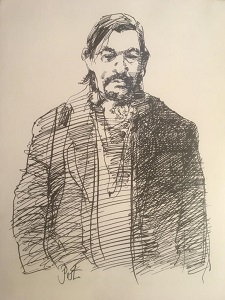
Alain Teister (12 januari 1932 – 6 februari 1979)
Portret door Waldemar Post, jaren 1970
De Britse schrijver William Nicholson werd geboren op 12 januari 1948 in Tunbridge Wells, Kent. Zie ook alle tags voor William Nicholson op dit blog.
Uit: Rich and Mad
“I've decided to fall in love,' said Maddy Fisher. Cath nodded to show she was listening, but did not look up from her magazine. `I'm seriously serious. I'm too young to get married but I'm too old to be single. I need love.' `And sex,' said Cath. `Well, yes. But I'm not talking about a quick grope at a party. I'm talking about can't-eat can't-sleep crazy in love.' `Any idea who?' said Cath. `Not a single clue.'
Outside the old coaching inn, on the broad grass verge beside the main road, there stood a large wooden camel. The camel was painted gold, and wore a curious smirk on its face. The inn was now a shop; more than a shop, an emporium, crammed with furniture imported from India and the Far East. It was called Caravanserai. But all those who stopped to explore its warren of exotic rooms knew it as the camel shop. Late one Wednesday afternoon in September, on the last day of the summer holidays, only three browsers remained as closing time approached: an elegant middle-aged woman and two very good-looking young men, her sons. The woman was intent on a display case of silver and coral necklaces. The older and more handsome of her two sons was sprawled in a teak planter's chair, his long legs stretched out and his eyes closed. The younger son wandered off to explore on his own. Up a flight of broad stairs hung with winking mirrors framed in fruitwood, through the high-windowed front room crammed with lacquered Ming Dynasty wedding cabinets, he made his aimless way at last to a back room that was given over to a display of cushions, textiles and rugs. He stood in the doorway and gazed into the cave of colours. A central skylight made of stained glass streamed crimsons and purples and golds on to bolts of glittering fabric. Beds of Indonesian bangsat wood draped in rainbow weaves crowded against chaises longues inlaid with patterns of rosewood acacia, on which plump cushions were piled in bright profusion. The room was a nest for an oriental princess. It was also Maddy Fisher's special place. Unseen at first by the visitor, Maddy was curled up on the bed, screened by a curtain of mirror-fabric. She heard the approaching footsteps and frowned in irritation, quietly closing the laptop that lay on the bed beside her.”
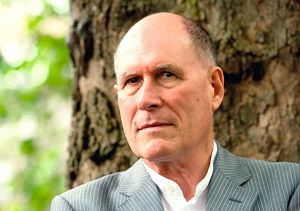
William Nicholson (Tunbridge Wells, 12 januari 1948)
De Duitse schrijver, schilder en componist Florian Havemann werd geboren op 12 januari 1952 in Oost-Berlijn. Zie ook alle tags voor Florian Havemann op dit blog.
Uit: Havemann
„Mein Vater war der Anfiihrer der Opposition in einem Staat, der offiziell keine Opposition zuließ. Mein Vater hat Gedichte geschrie-ben, mein Vater hat Bücher geschrieben. Ich bin Elektriker von Beruf, ich habe Bühnenbild studiert, habe als Reinigungskraft gearbeitet. Ich habe Bilder gemalt, Theaterstücke geschrieben, ein paar Gedichte auch, einen Roman bisher. Ich habe Musik gemacht, Musik komponiert. Ich bin zum Verfassungsrichter geworden. Ich habe für den Bundestag kandidiert. Ich bin Herausgeber einer Zeitschrift. Und das ist Havemann. Vielleicht in meinem Falle schon Havemann im Delirium, in einem Zuviel an Have-mann. Aber Havemann, denn Havemann bedeutet: sich nicht auf eine Sache festlegen wollen, sich nicht auf eine einzige Sache festlegen können. Aber aus Havemann wird auch dann erst richtig Havemann, wenn sich Havemann mit Nicht-Havemann verbindet. Mein Großvater hat eine ad-lige junge Dame geheiratet, eine Malerin. Mein Vater hat eine Karin von Bamberg geheiratet, meine Mutter. Eine Kriegerwitwe. Die Frau eines U-Boot-Kommandanten, der im Atlantik verblieben ist. Und ich, ich habe eine Französin geheiratet, eine junge Frau aus der französischen Provinz, der mittellose Künstler hat sich mit einer Frau zusammengetan, die in einer gutbürgerlichen Familie groß geworden ist, der Atheist Havemann hat sich mit einer Katholikin zusammengetan, und das ist Havemann. Sich mit Nicht-Havemann zu verbinden, das ist Havemann.
April 2oo6, an einem Wochentag, morgens früh, Viertel nach sechs, kurz vor halb sieben. An einer Bushaltestelle, an der Bushaltestelle, an der ich immer einsteige, um von meinem Atelier, meinen Arbeitsräumen am Kottbusser Damm, zur Wohnung, unserer Wohnung, der der Familie Havemann, in der Schleiermacherstraße zu fahren. Das kann doch nicht wahr sein. Ich glaub, mich tritt ein Pferd — nein, kein Pferd weit und breit zu sehen, in Berlin doch nicht.“
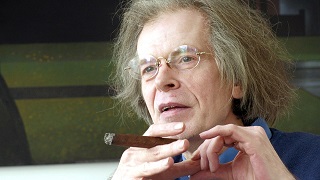
Florian Havemann (Oost-Berlijn,12 januari 1952)
De Franse schrijver Charles Perrault werd geboren op 12 januari 1628 in Parijs. Zie ook alle tags voor Charles Perrault op dit blog.
Uit: La Belle au bois dormant
« Il était une fois un Roi et une Reine, qui étaient si fâchés de n'avoir point d'enfants, si fâchés qu'on ne saurait dire. Ils allèrent à toutes les eaux du monde ; voeux, pèlerinages, menues dévotions, tout fut mis en oeuvre, et rien n'y faisait. Enfin pourtant la Reine devint grosse, et accoucha d'une fille : on fit un beau Baptême ; on donna pour Marraines à la petite Princesse toutes les Fées qu'on pût trouver dans le Pays (il s'en trouva sept), afin que chacune d'elles lui faisant un don, comme c'était la coutume des Fées en ce temps-là, la Princesse eût par ce moyen toutes les perfections imaginables. Après les cérémonies du Baptême toute la compagnie revint au Palais du Roi, où il y avait un grand festin pour les Fées. On mit devant chacune d'elles un couvert magnifique, avec un étui d'or massif, où il y avait une cuiller une fourchette, et un couteau de fin or garni de diamants et de rubis.
Mais comme chacun prenait sa place à table, on vit entrer une vieille Fée qu'on n'avait point priée parce qu'il y avait plus de cinquante ans qu'elle n'était sortie d'une Tour et qu'on la croyait morte, ou enchantée. Le Roi lui fit donner un couvert, mais il n'y eut pas moyen de lui donner un étui d'or massif, comme aux autres, parce que l'on n'en avait fait faire que sept pour les sept Fées. La vieille crut qu'on la méprisait, et grommela quelques menaces entre ses dents. Une des jeunes Fées qui se trouva auprès d'elle l'entendit, et jugeant qu'elle pourrait donner quelque fâcheux don à la petite Princesse, alla dès qu'on fut sorti de table se cacher derrière la tapisserie, afin de parler la dernière, et de pouvoir réparer autant qu'il lui serait possible le mal que la vieille aurait fait."
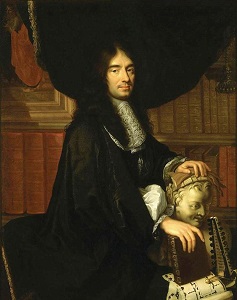
Charles Perrault (12 januari 1628 – 16 mei 1703)
Portret door Philippe Lallemand, 1672
|



